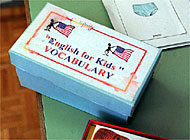
English becoming lingua franca of Swiss business

Although Switzerland has four national languages, English is increasingly becoming the language of business. That fact was underlined recently, when canton Zurich - the country's main financial centre - made English the first foreign language to be taught in schools, at the expense of French.
A visitor to Switzerland who turns on the television, listens to the radio or glances at a newspaper could be forgiven for thinking that English was one of the country’s official languages.
Adverts increasingly contain English words, particularly job ads, and more and more Swiss firms, from telecommunications operators, Swisscom and Sunrise, to health insurers and charities are using English to get their message across.
“The telecommunications market is English-dominated and many of the products have English names,” says Swisscom spokeswoman, Pia Rogers. “English is fashionable and in many ways it might be easier for Swisscom to handle one language than four.”
Rogers is quick to stress that it’s all about respecting clients and communicating with them in the most direct way.
The increasing use of English might be most obvious in the media, but for many Swiss, the language is becoming the lingua franca of office life.
More and more children are also learning English as their second language rather than one of the country’s other main languages, German, French and Italian. Recently, the Zurich educational authorities decided to make English the first “foreign” language, sparking much controversy in the French-speaking part of Switzerland.
“There are at least two generations of people who have a knowledge of English,” says Ralph Ehinger, a partner of the advertising agency, Ramstein/Ehinger Associates. “Words like ‘business’, ‘enterprise’ and ‘solutions’ are entering the country’s daily language.”
The use of English is especially prevalent in sectors such as telecommunications, information technology, banking and insurance. In other words, globalised industries where the United States often takes the lead and English offers recognised key words.
There’s also a sound financial reason for using English in advertising in a country which has three main national languages.
“You can spend less money on a campaign if you use English than the national languages,” says Ehinger. “Clearly, if you have to translate your campaign into three different languages, it’s more expensive.”
The jobs’ pages in the newspapers also contain more and more English a knowledge of the language becomes a priority for Swiss employers.
“A command of English is more important than ever,” says Edouard Comment, chef executive of employment agency, Adecco Switzerland. “If you don’t speak the language it’s increasingly difficult for executives to get a key position, but it’s also important for secretaries and personal assistants.”
Comment says some knowledge of English is a requirement in around 90 per cent of executive vacancies. But he stresses that most employers are still looking for native speakers of Swiss German, French or Italian rather than native English speakers.
Switzerland’s multi-lingual and highly educated workforce is considered a real advantage by companies locating here and the addition of English to many peoples’ skill-base is sharpening the country’s competitive edge.
by Michael Hollingdale

In compliance with the JTI standards
More: SWI swissinfo.ch certified by the Journalism Trust Initiative






























You can find an overview of ongoing debates with our journalists here . Please join us!
If you want to start a conversation about a topic raised in this article or want to report factual errors, email us at english@swissinfo.ch.